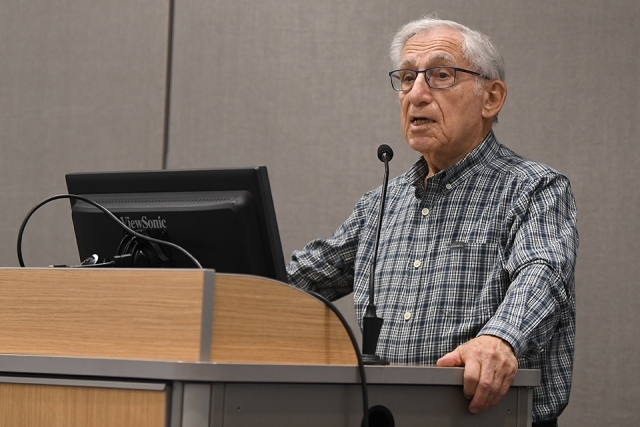

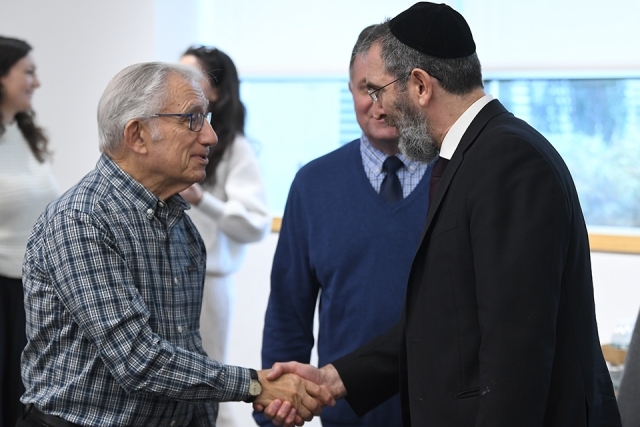
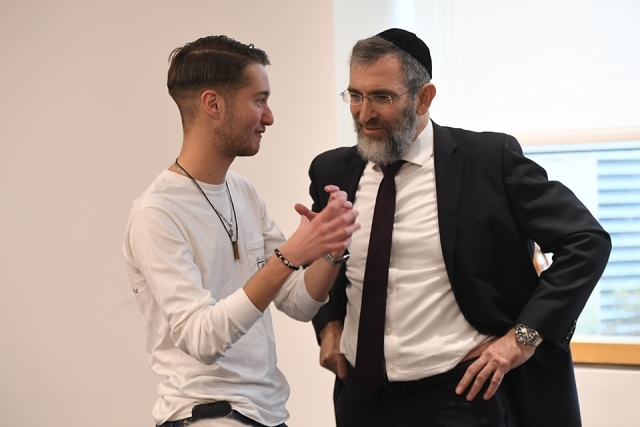
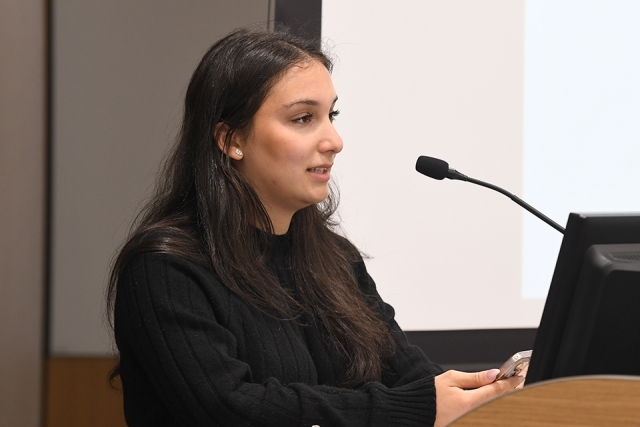
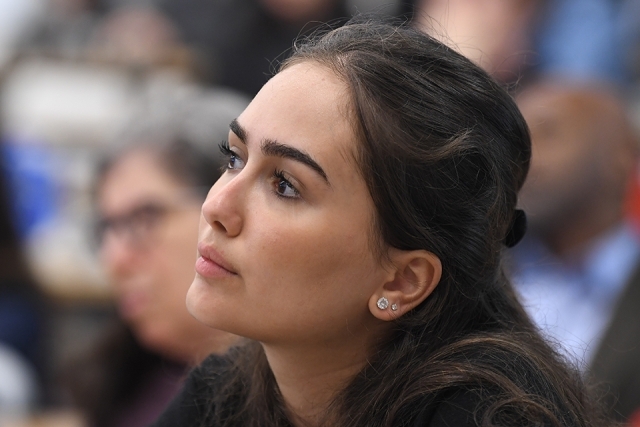
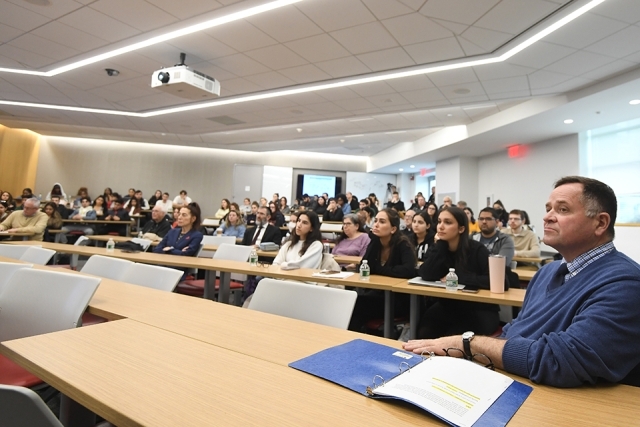
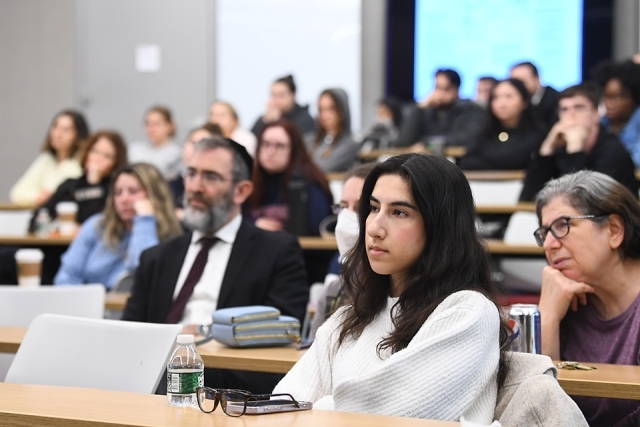
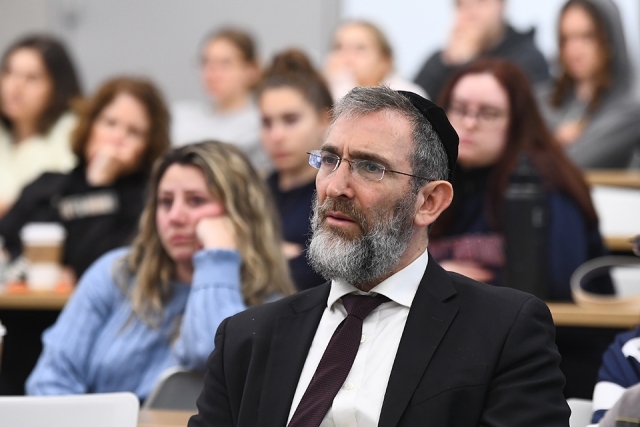
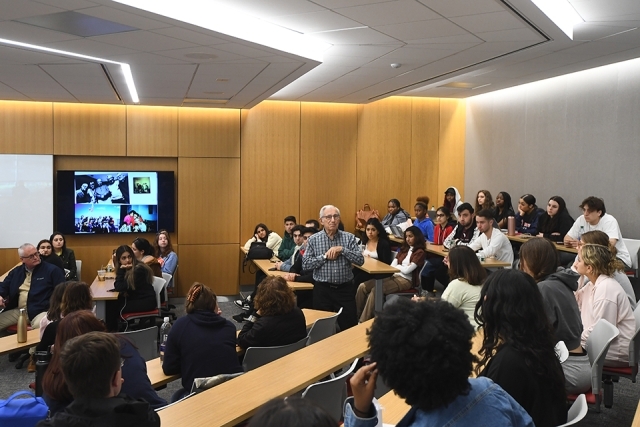
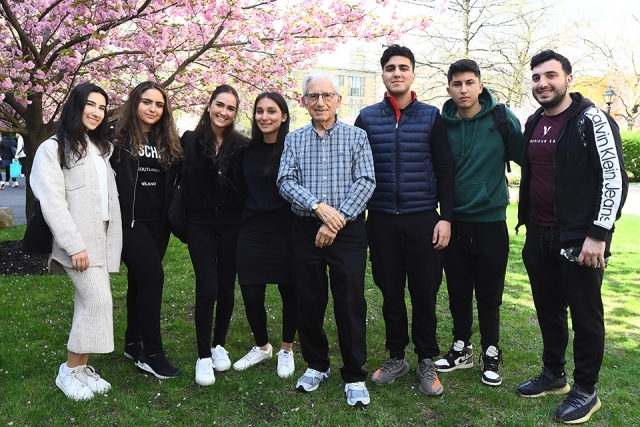











On Holocaust Remembrance Day, a survivor of Nazi Germany’s attempt to exterminate European Jews delivered a message of hope to the St. John’s University community.
Manfred “Manny” Korman, 91, of Great Neck, NY, addressed an interfaith gathering of students, faculty, administrators, and staff in St. Albert Hall, recalling his experiences as a child refugee separated from his family as the Nazis undertook a systematic genocide that resulted in the deaths of six million Jews from 1933 to 1945.
The hour-long discussion on April 17, presented by the Interfaith Council of Campus Ministry and the Jewish Students Association, was followed by a question-and-answer session in which attendees applauded Mr. Korman’s optimistic spirit.
“I give my mother credit for that,” Mr. Korman said. “She always said, ‘I put my two children on a train not knowing if I would ever see them again, and I got them back.’ She had such a positive attitude despite what we went through.”
Mr. Korman called his survival and subsequent journey to the United States miraculous. “It should not have happened,” he admitted.
Living in Hamburg, Germany, with his brother and parents, in October 1938 the family was rounded up by Nazi police and transported to a camp in Poland. A month later, the British government agreed to harbor child refugees from the Nazis, and Mr. Korman’s parents made the gut-wrenching decision to send Manny, then six, and Gerd, 10, to England, where they lived with a host family.
“We were given 20 to 30 minutes to pack our bags,” Mr. Korman said of the night the Nazi police arrived. “I remember my brother saying that for the first time someone else, not our father, was in charge of us.”
During Passover in 1939, the German government allowed Jewish heads of households to return to the country to secure their homes and possessions. Back in Hamburg, Mr. Korman’s father sought a way to extricate his family from Europe.
He secured passage aboard the ocean liner St. Louis to Havana, Cuba. When the refugee boat was refused permission to dock, first in Cuba and then in the US, Mr. Korman’s father returned to Europe, spending the war years in a transit camp in the Netherlands.
Meanwhile, with help from relatives, Mr. Korman’s mother emigrated to the United States. She finally secured passage for her sons in September of 1940. Their journey to New York as part of a multivessel convoy was perilous: German U-boats sank the boat ahead of them and the one behind.
“But we made it,” Mr. Korman said.
In 1945, Canadian forces liberated the Netherlands camp housing Mr. Korman’s father and 100,000 other refugees. In July 1946, he arrived in the US—more than six years after last seeing his children.
“We were a family once again,” Mr. Korman recalled.
Mr. Korman went on to become a principal in the New York City school system. Gerd, now 94, became a professor of history at Cornell University. Together, the brothers have 18 grandchildren and several great-grandchildren to whom they share their stories of the Holocaust.
“You really can’t avoid talking about it,” Mr. Korman said.
Honest dialogue is the key to ensuring atrocities such as the Holocaust are never repeated, said junior Mazal Malayev, a Biomedical Sciences student and Religious Chair of the University’s Jewish Students Association.
“It’s important to educate others about the Holocaust,” Mazal said. “We’ve seen an increase in anti-Semitism in America lately, and a lot of people don’t realize that 100 years ago it all started with hate speech and rhetoric against the Jewish people.”
Jewish Students Association President Gabriella Kandchorov, a Biology student graduating in May, said it is essential to recall the sacrifices made by Mr. Korman and others during the war. “A few years from now, we won’t have survivors to tell their stories,” she said. “Their stories have to be told so people don’t forget what happened.”
A sought-after speaker, Mr. Korman shares his survivor experiences with schools, library groups, fraternal organizations, and museum visitors throughout the New York City area. Amid his hopeful message, he reminded the St. John’s audience of the need for vigilance amid resurgent anti-Semitism and Holocaust denialism.
“We have to speak out about anything that is opposed to human respect,” Mr. Korman said. “As for people who deny the Holocaust happened, I am not convinced they are not using denialism as a vehicle for themselves and people in their groups that makes for good press.”
“All we can do,” Mr. Korman continued, “is to continue to educate and hope the goodness of people comes forth.”
Related News
An Equation for Hope: Longtime St. John’s Administrator Must Find a Kidney Donor
Christine M. Goodwin '96C, '98G, '07PD, '21Ed.D., is not one to leave things to chance. At 51, she has built a career as Assistant Provost for Institutional Research in St. John’s University’s Office of Institutional Research.
St. John’s Athletes Welcome Area Special-Needs Students
Eager to give back to a deserving community, St. John’s University student-athletes welcomed more than 300 special-needs children from New York City schools to the Queens, NY, campus for a day of sports-based fun on April 23.
St. John’s Salutes Veterans and Their Legacy in Campus Ceremony
St. John’s University celebrated veterans from near the Queens, NY, campus and beyond on November 7 during the University’s annual Veterans Day Luncheon in the D’Angelo Center ballroom. Veterans and...
